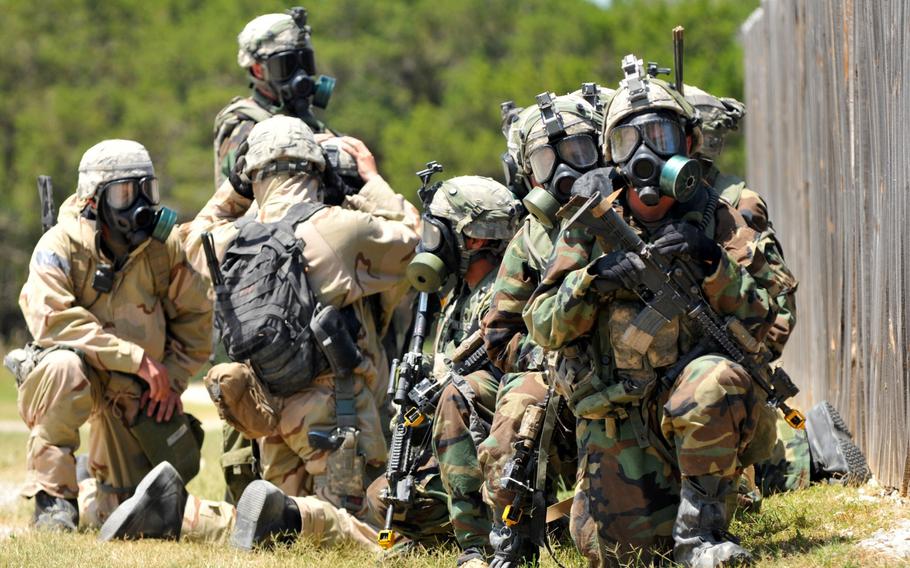
Soldiers of the 3rd Battalion, 8th Cavalry Regiment, 3rd Brigade Combat Team, 1st Cavalry Division and 48th Chemical Brigade prepare to approach a simulated chemical threat July 13, 2014, while conducting training at the military operations on urban terrain site Boaz at Fort Hood, Texas. Training such as this and Exercise Fortune Guard, which begins Aug. 4 in Hawaii, is intended to develop skills in detecting and neutralizing weapons of mass destruction. (Chuck Burden/US Army)
FORT SHAFTER, Hawaii — Exercise Fortune Guard makes its debut Monday in Hawaii, a multinational training event focused on detecting and defending against weapons of mass destruction.
The exercise arrives on the heels of new provocations by North Korea, which fired a short-range ballistic missile into waters off its east coast Saturday. On Monday, the director of the North Korean military’s General Political Bureau told his countrymen in a broadcast speech that if the nation’s sovereignty is threatened, “our troops will fire our nuclear-armed rockets at the White House and Pentagon,” according to news reports.
But the timing of Fortune Guard isn’t directly tied to this most recent round of saber-rattling by North Korea, said Adm. Samuel Locklear III, the commander of U.S. Pacific Command, during a news conference Tuesday at the Pentagon.
“Next week’s exercise is just one that we’ve had scheduled for a while,” Locklear said. “This particular event that’s playing out in the press now will just re-emphasize the importance of getting it right during our exercise.”
PACOM is hosting the first of six planned annual Fortune Guard exercises. New Zealand will host next year’s event, followed by Singapore, Australia, Japan and South Korea.
Fortune Guard is part of the Proliferation Security Initiative, launched by President George W. Bush in 2003 and now endorsed by more than 100 nations. Its intent is to prevent illegal trafficking of WMDs.
The nearly 20 Pacific-region nations that have endorsed the PSI have been invited to attend the exercise, according to a PACOM statement. India and China are two notable nations that have not signed on.
The exercise is designed to improve WMD interdiction skills, from high-level decision-making to ground-level tactics. Fortune Guard will include interactive academic seminars and port, sea and tabletop exercises.
Japanese and South Korean teams will board at sea the USNS Henry J. Kaiser, which will pose as a vessel suspected of carrying weapons of mass destruction. Norwegian officials will share lessons learned about the removal of chemical weapons from Syria.
The portside demonstration is expected to include the U.S. Army Explosive Ordinance Disposal team with the 93rd Civil Support Team-WMD; U.S. Customs and Border Protection Anti-Terrorism and Contraband Enforcement Team; and teams from Japan and South Korea. The portside event will employ an Air Force C-17 and standard shipping containers for simulated detection of radioactive materials.
While the greatest global threat from WMD comes from non-state militants who could use such weapons for maximum terror, North Korea remains a wild-card state in its potential use of missiles, whether conventional or nuclear, though it is not thought to have the ability yet to produce a nuclear comb small and durable enough to put into a warhead.
This week, the United Nations imposed sanctions against a North Korean shipping company for trying to smuggle from Cuba two fighter jets, missiles and other ammunition beneath a load of sugar.
Locklear rejected the idea that the U.S. was “losing ground” in efforts to contain North Korea’s weapons in light of recent provocations.
“We have a growing interest among nations in the region and throughout the world in participating in our counter-proliferation exercises, and we’re growing our capabilities across nations and across institutions to be able to better anticipate and deal with this,” Locklear said. “I think all around we’re getting better.”
An “essential part of the way ahead in this part of the world” is the denuclearization of North Korea, he said.
Intelligence analysts widely debate North Korea’s actual nuclear capabilities, Locklear said, but admitted, “As a military commander, I have to plan for the worst.”
“I believe they continue to make steady progress in both their missile technology and their nuclear capability, and they desire to continue to do that,” he said.